
Macau: Las Vegas of Asia
Just a little over 24 hours after flying from Mandalay to Bangkok in early June, 2018, I hopped on another flight, this time to the tiny yet densely-populated region of Macau, which is located as close to China as possible. To put it in perspective, Macau’s airport is on the opposite side of Macau from the border, yet it is still less than two miles (the way a crow “Chinese spy dove” flies) away from China’s mainland province of Guangdong.
Macau’s major tourist attractions are its Vegas-like casinos and colonial (Portuguese) culture and architecture, but it has long been like a second home to me for more practical reasons. In fact, the first night I ever spent on Asian soil was in a Macau flat, twenty-one floors above the infamous Canidrome (Asia’s only Greyhound dog race track). And a decent chunk of my first year in “China” was actually spent in Macau, including a 44 days straight during the SARS epidemic in early 2003. From then on, I’ve had a soft spot for Macau and always love to return.
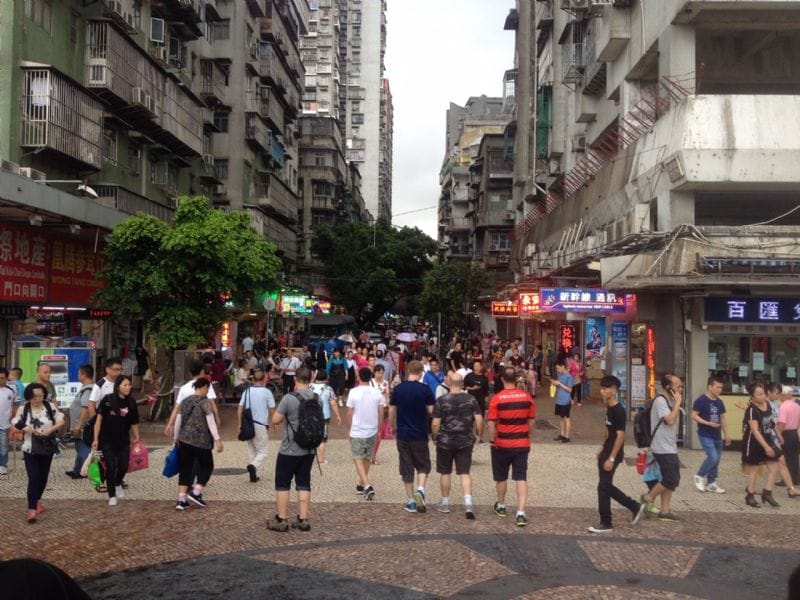 Welcome to Macau! My first “home” in Asia was a 10-15 minute walk from the border, down this street and to the right.
Welcome to Macau! My first “home” in Asia was a 10-15 minute walk from the border, down this street and to the right.
As Close As I Can Get
Since the Chinese PSB decided not to permit my personal presence on the mainland anymore, Macau is now the best place for me to get up close and personal with China. There are numerous spots in the region where you can practically “reach out and touch” the mainland. On this particular visit (June 5-12, 2018), my primary goal was to spend as much time as possible exploring the Chinese border. I not only wanted to “feel” close to China, but also to reconnect in some small way by continuing to utilize as much of their infrastructure as I could.
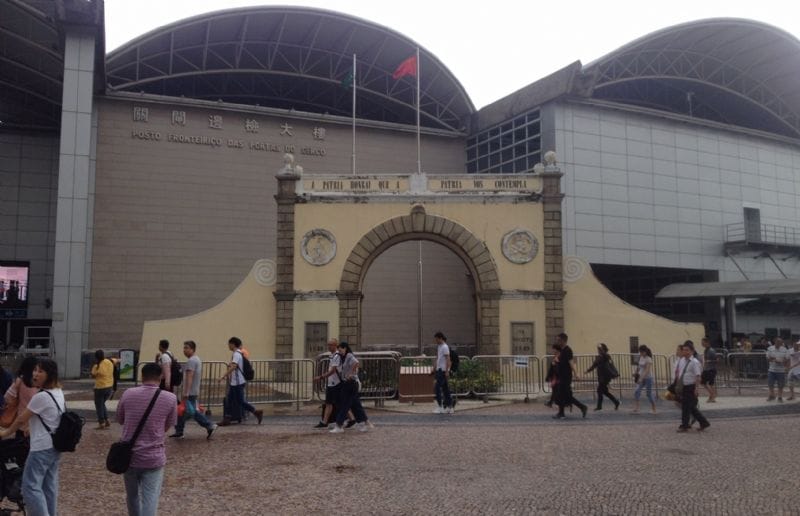 This is the Macau side of the large Gongbei China-Macau Border Complex
This is the Macau side of the large Gongbei China-Macau Border Complex
For instance, in Sun Yat Sen Park, just up the road from the extremely busy Gongbei border between Macau and China, you can stroll around placid duck ponds, go for a swim in a beautiful public pool, or relax in a quiet and cool (A/C!) public library*, all within an easy stone’s throw of China, just across a narrow canal to the north.
*In a crazy coincidence, this small library is one of a handful in Macau funded by Wong Leng Kuan, a Peruvian-Chinese businessman who returned to his homeland in Macau late in life.
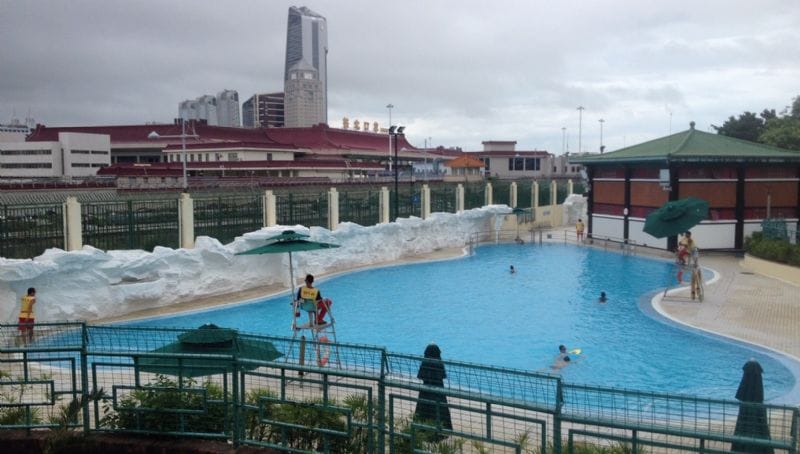 The red buildings that make up the Chinese Border Control loom just beyond the fence on the left.
The red buildings that make up the Chinese Border Control loom just beyond the fence on the left.
Here in this peaceful park I was even able to use my Chinese cell phone to have long conversations with friends and family back in the mainland. I found that by remaining on the side of the park nearest to the border, cell service stayed pretty sharp. In between phone calls, I could eavesdrop on the announcements being made inside the gigantic Zhuhai Railway Station looming just a few hundred yards away across the canal.
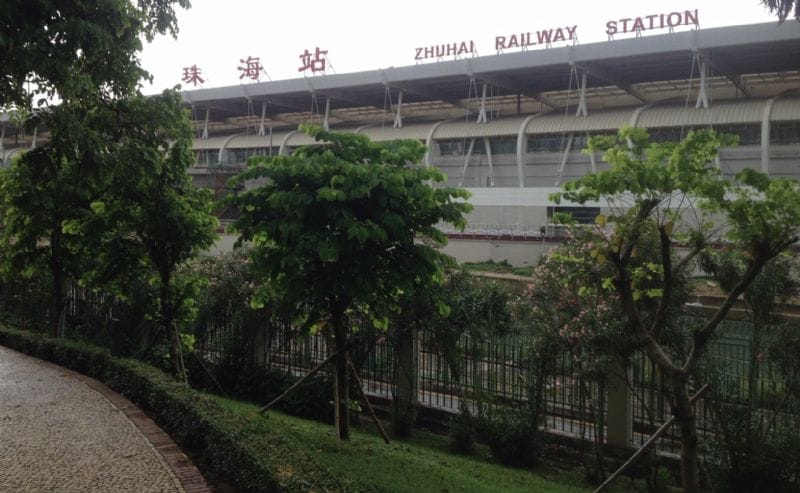
From Sun Yat Sen Park, following the border canal to the west, you come to an industrial zone which also sits right across from China. Eventually giving way to a larger body of water which runs all along the entire western border of Macau, the canal is narrow enough in some places that I was tempted to try and kick a few of my Chinese Mission Balls* over to the other side.
*If I’d had baseballs or footballs, instead of soccer balls, I would’ve done it for sure!
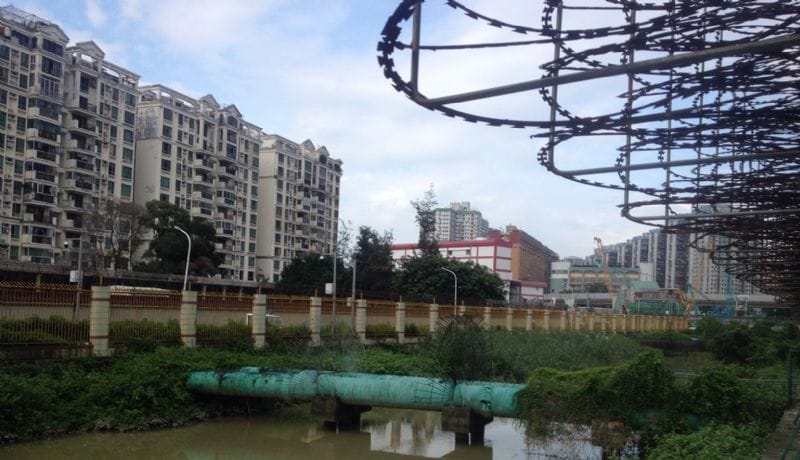 A “normal” Chinese apartment block just over the border canal. There was also a small military institution nearby.
A “normal” Chinese apartment block just over the border canal. There was also a small military institution nearby.
One Campus, Two Nations
However, there is one place in Macau where you can literally “touch” China. The campus of the University of Macau, although still technically considered part of Macau’s territory, is actually located on the Chinese mainland, across the water to the south and west of the city. You get to this new campus, which is located on land leased from the Chinese city of Zhuhai, by taking a bus that goes under the water via a special tunnel that was dug out to give direct access.
I didn’t know about any of this until one of my local friends took me to check it out during a short visit the year before (2017). The highlight is the massive library, open to the public and towering over the middle of campus, with countless quiet and comfortable places to sit, read, work, and study. Macau’s weather is often hot and muggy, so this air-conditioned oasis, full of books and free WIFI, is an unbelievable blessing; and all right in China’s backyard!
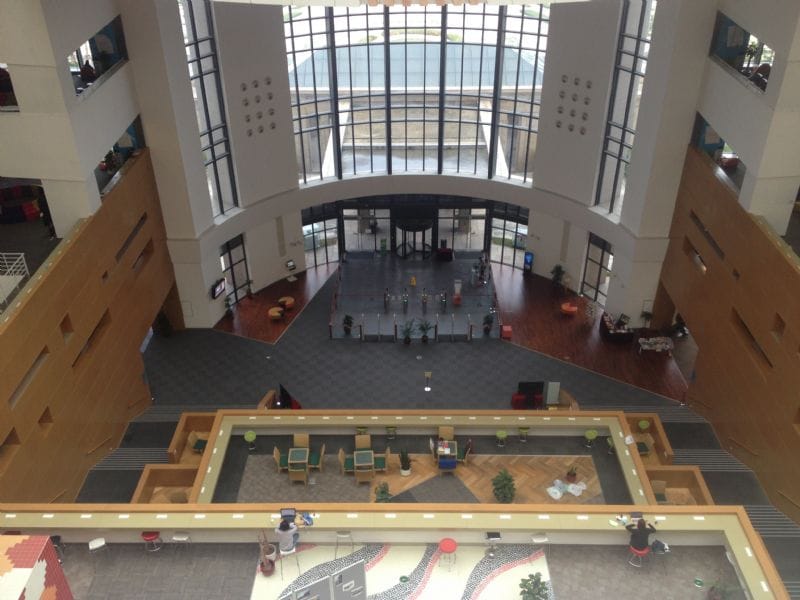 This was taken from one of the library’s upper floors, looking down past a few of the many study/work areas towards the entrance far below.
This was taken from one of the library’s upper floors, looking down past a few of the many study/work areas towards the entrance far below.
To top it all off, this university library is emphatically NOT a “Chinese” library. There are hundreds of thousands of books on nearly every subject imaginable, even “taboo” subjects that Communist China tries to hide. There are even large collections of books on Christianity (as a former Portuguese colony, Macau has had much Catholic influence) and some of the early Protestant missionaries to the region. All in all, it is a lovely place to spend a quiet afternoon.
The university grounds are also very well groomed, with numerous lakes and gardens and pathways to explore. Someone might be thinking, “Hey, so why can’t you just walk on into China?” Not so fast. Although located on the Chinese mainland, there is no direct access, as there is a large wall surrounding the campus on three sides (the waterfront is the fourth “side”). And there are guards and infrared cameras watching the wall at all times, not to mention a moat located on the inside of the wall, which combined makes for quite the barrier between the university gardens and the busy Chinese avenue less than a hundred yards away.
 Night view of the moat and border wall, taken from inside the University campus. There is a large avenue just beyond the wall.
Night view of the moat and border wall, taken from inside the University campus. There is a large avenue just beyond the wall.
Ironically, this whole setup does NOT primarily exist to keep people like myself (persona non grata in China) from sneaking into China. How many people are really clamoring to sneak into the Communist nation? No, the primary purpose of the wall is to keep Chinese citizens from illegally sneaking out of China and into Macau. In doing some research, I found a few articles discussing attempts that had been made, but oddly (insert sarcasm here) nothing about deported missionaries trying to sneak back in. Ha!
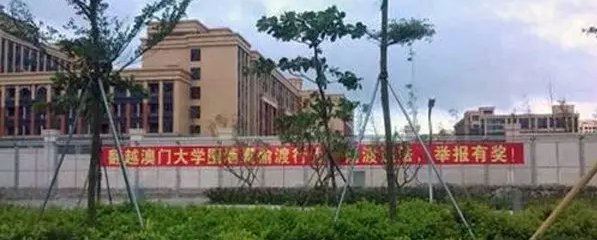 Here you can see the wall from China looking into the campus, with a warning against trying to sneak in.
Here you can see the wall from China looking into the campus, with a warning against trying to sneak in.
During my visit that day, I took pictures and thought through a few escape scenarios, eventually coming to the conclusion that it would be much too difficult to be worth the risk. Nothing less than a Mission Impossible sequence would be needed to pull it off. Nevertheless, it was fun to think about, and it was nice to have such a relaxing place to visit and still be so close to China.
In the evening, I sat at a large desk on one of the upper floors of the library, gazing out a large window at the bustling Chinese suburb (across the wall) below. It was fairly easy to pretend like I was actually there. And I almost was. If you look carefully at the picture below, you can see my reflection in the window (orange shirt), as well as the lighted border wall and the Chinese apartment complex looming just beyond.
Team Meeting in Exile
After spending my first few days in Macau obsessed with exploring the different Chinese border zones, it was now time to meet up with my two friends and teammates (we’ll call them Ismael and Liam) coming down to see me from the mainland. I’ve worked alongside these brothers for going on two decades, but for security reasons we hadn’t spent too much time together during my final weeks in China. In Macau, we would be able to meet freely and hang out for a few days, discussing many important things pertaining to the future of our ministry in China.
After a long delay at the land border, where Liam was asked to show lots of Chinese cash that he didn’t need as “proof” that he was only coming to Macau as a tourist (ie, to gamble) and not to “stay”, both guys finally wandered out of the immigations building on the Macau side. We hopped on a city bus* for the short ride to the hotel. Our room was on one of the upper floors, with panoramic views of the south China coast and the Pearl River Estuary out our window. With our “bird’s eye” perspective, we began a much needed time of fellowship and debriefing.
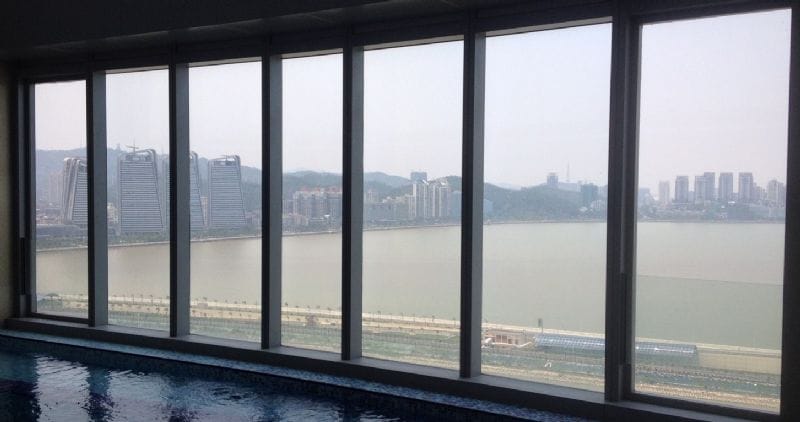 The coastal areas of the Chinese city of Zhuhai, just north of Macau, taken from one of our hotel windows.
The coastal areas of the Chinese city of Zhuhai, just north of Macau, taken from one of our hotel windows.
That afternoon, I took the guys to visit my old stomping grounds, just a mile or so away. The aforementioned 21st floor apartment (above the Canidrome) where I lived back in 2003 is within walking distance of both the border and our hotel. Back in the “old days” of just dumb phones, cellular signals would reach well into Macau, and a Chinese teammate of ours had the tough job of sitting in her apartment and answering curious (or angry) calls from Chinese citizens or Communist police responding to the many tracts being distributed by teams on the mainland.
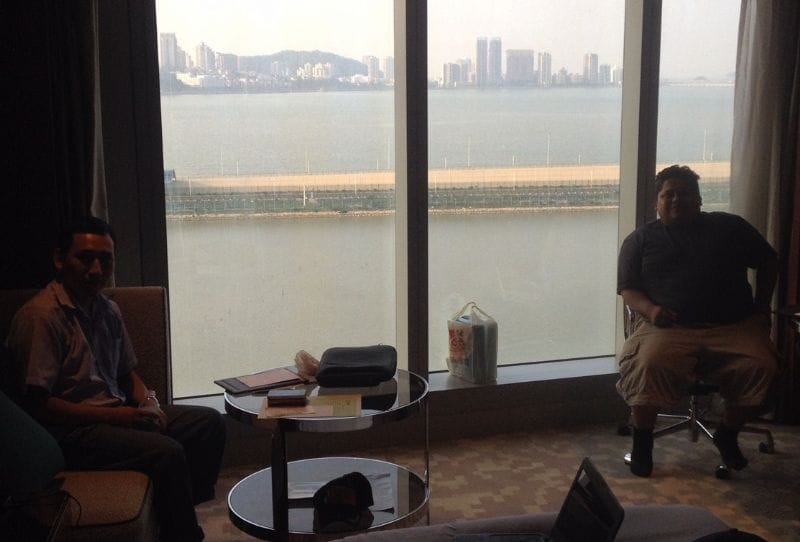
Later that evening, we took another bus* across the city (actually, across the water to one of the other islands that makes up Macau) to attend an evening church service and meet some friends. This particular church is an English-Portuguese speaking congregation** with a Brazilian pastor. There are members from Brazil, Portugal, the Philippines, and elsewhere around the world. It is hard to overestimate the blessing of worshiping freely with believers from many nations, and introducing my friends to like-minded folks from back “home” in the Americas.
*Macau’s very convenient bus system is amazing, affordable, and best of all, air-conditioned!
**A few months later, my family would return to Macau, where this same church would host us in their building for most of our two week visit, which was an immense blessing.
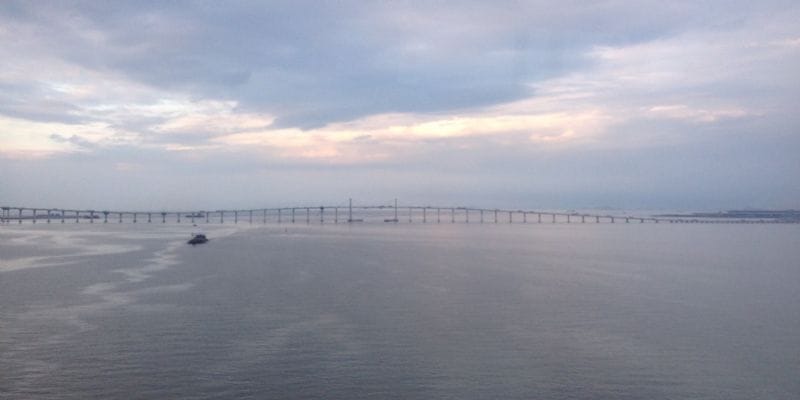 Macau’s peninsula and outlying islands are connected by three bridges like this one, with inexpensive buses plying each one all day, every day.
Macau’s peninsula and outlying islands are connected by three bridges like this one, with inexpensive buses plying each one all day, every day.
The Cotai Strip
The next day we moved to a different hotel on the opposite side of Macau, on the Cotai Strip. Macau’s geography is extremely unique. Besides the peninsula (Macau proper) jutting out into the South China Sea, there are also some islands connected by long bridges. The two largest islands, Coloane and Taipa, include much land “reclaimed” from the sea. In fact, these two islands have been officially (or, “artificially”) connected to one another by a stretch of reclaimed land. Thus was the Cotai (Co-loane + Tai-pa) Strip formed, to make room for more casinos!
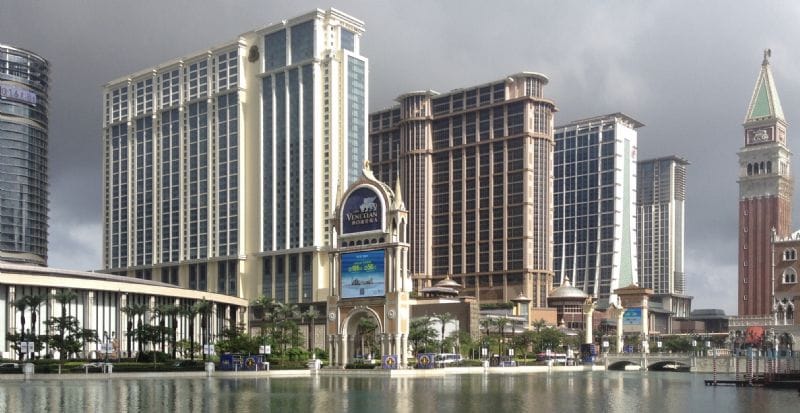
After checking in to our Holiday Inn Express (probably the most affordable hotel in the area), we wandered around a gigantic maze of malls, including The Venetian, replete with indoor canals and gondola rides (and serenading European gondoliers). From there, we continued on to the home of a sweet couple with whom I’d been staying prior to my teammates arrival. They had invited us to an early dinner, along with a few other old friends whom I have known since first arriving in Macau back in early 2003. I think six different nations were represented among the seven or eight of us at the table, including our Macanese host and her Chinese husband.
Fernando’s @ the Beach

After a sweet time of fellowship, we hopped on a bus to squeeze in an evening visit to Hac Sa (Black Sand) Beach. This is one of my favorite places in Macau, going all the way back to my earliest days there.
The highlight is Fernando’s, an authentic Portuguese restaurant located just steps from the water. The (complimentary) baked bread bread, fresh salads, and grilled meats are nothing like “typical” Asian fare, and the prices aren’t bad either*. Depending on what dishes you might be missing from back home, you can order everything from Grilled Quail, Pollo a la Brasa (a la Peru), or a plate-sized slab of Bistec like you might find in Portugal or Patagonia.
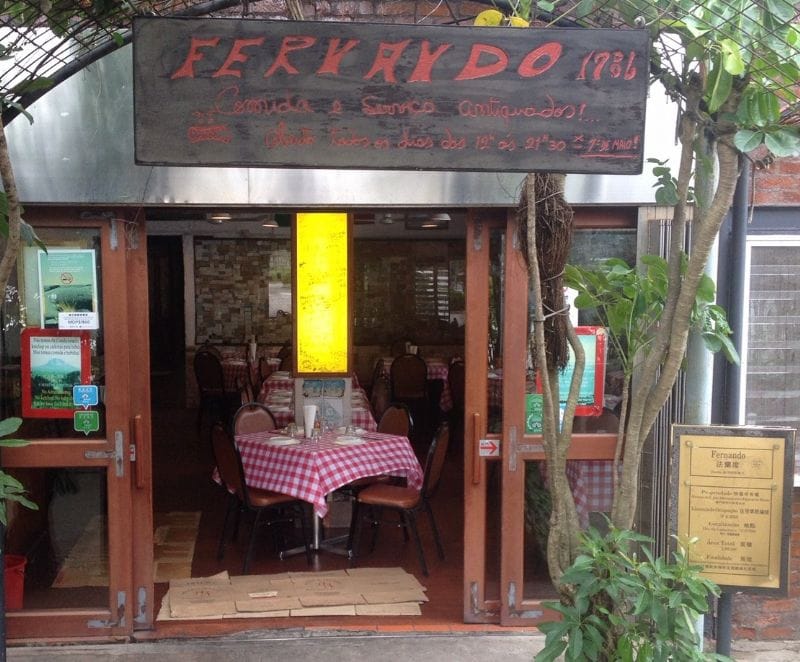
Although still filling quite full after our early dinner, we somehow managed to find space to sample a few of the items that my teammates hadn’t tasted in quite awhile (read: years).
*For my fellow Okies, Fernando’s is the Macau version of “Meers Restaurant” in the Wichitas.
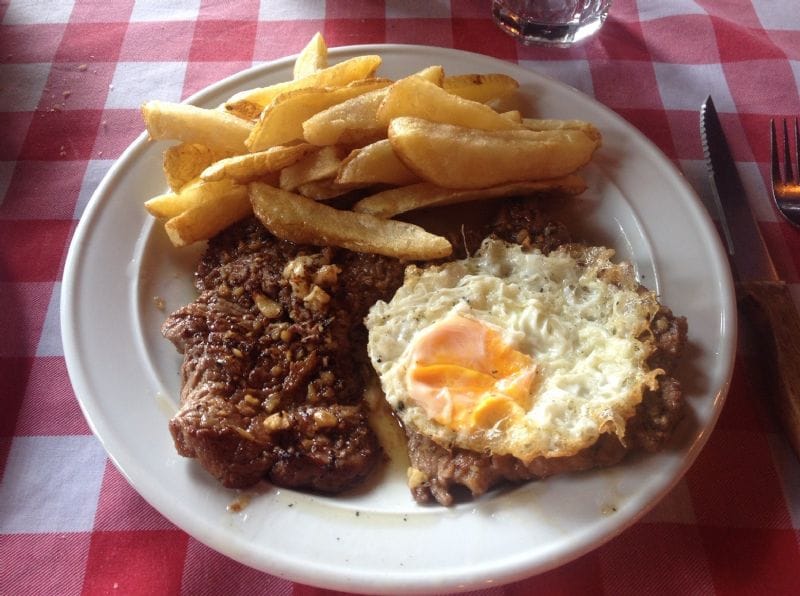 Plate sized portion of “bistec & eggs”, which I enjoyed on a solo visit earlier in the week. This is one of Fernando’s simpler meals.
Plate sized portion of “bistec & eggs”, which I enjoyed on a solo visit earlier in the week. This is one of Fernando’s simpler meals.
The House Doesn’t Always Win
After making our way back to the Cotai Strip, we ran into a small problem. Although our room was fairly inexpensive, and the location was great for our departure the next day, there were only super-expensive hotel shops and “room service” available in this part of town, and we needed water! So we decided to have a little bit of fun out “on the town”…
Our explorations earlier in the day had taken us through a handful of large casinos, which brought about mixed feelings. In one way, it was fascinating to see these places up close. It was like being on the set of a Jackie Chan or kung fu movie. On the other hand, seeing so many people given over to greed and addiction up close and personal is sobering.
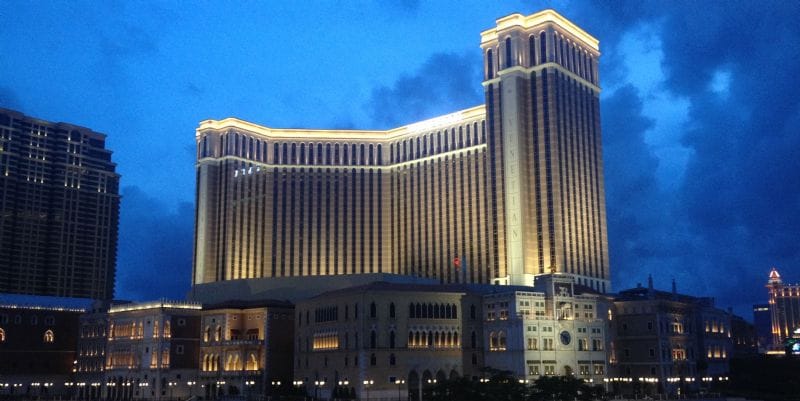 The Venetian is definitely a mixed bag. The indoor mall (a Venice replica) is amazing, but the huge casino is the main attraction.
The Venetian is definitely a mixed bag. The indoor mall (a Venice replica) is amazing, but the huge casino is the main attraction.
In fact, I felt a bit weird being allowed onto the casino floor at all. I may be in my mid-30s, but in some ways I still feel like a teenager who has no business in certain types of venues. (One other note: you aren’t allowed to wear hats in the casino, so the cameras can see your eyes at all times. I had to be reminded repeatedly by security to take off my ball cap, or turn it around backwards.)
So with that introduction, our “bright idea” was to wander around the large casino floor connected to the lobby of our hotel, helping ourselves to the free bottles of water available in various places. As there was no signage saying that the Complimentary Water was only for actual gamblers, we quenched our thirst on the house while grieving for multitudes of lost gamblers all around us. In the end our wallets and our hearts were living proof that the house doesn’t always win!
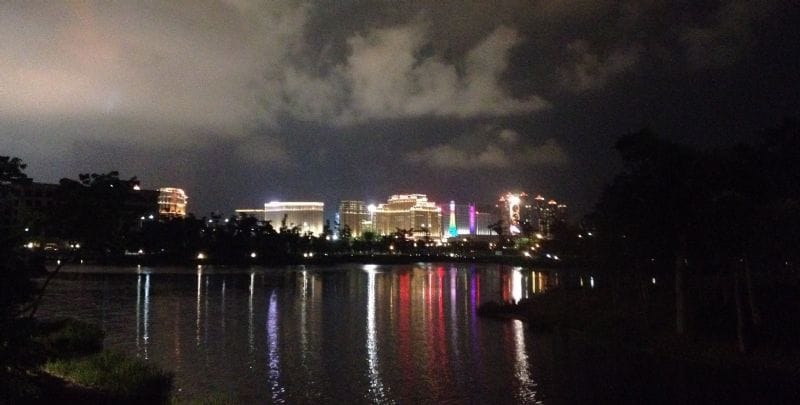 The lights of the Cotai Strip seen at night from the campus of Macau University on the Chinese mainland.
The lights of the Cotai Strip seen at night from the campus of Macau University on the Chinese mainland.
Pulling an All-Nighter
I should have seen it coming. Due to our limited time together, we ended up staying awake nearly the entire night discussing all manner of things related to ministry, family, and calling. When the only two choices were between getting a full night’s sleep or spending those precious hours talking with folks you might not see for many months (or longer), the answer became obvious. I would have time to sleep on the plane or at my next destination.
Speaking of which…
Family Reunion in Bangkok
The next day I flew back to Bangkok, Thailand. After napping most of my way there on the plane, I arrived in plenty of time to get settled at the little guest house provided by our good friends and partners in ministry Albert and Jiep. This was no ordinary day! My wife and kids were scheduled to fly in from northwest China late that night to reunite with me after almost three weeks. When they landed safely, we were all of course thrilled to see one another, even at the exhausting hour of 3am!
To Be Continued…








